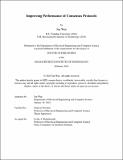Improving Performance of Consensus Protocols
Author(s)
Wan, Jun
DownloadThesis PDF (710.3Kb)
Advisor
Devadas, Srinivas
Terms of use
Metadata
Show full item recordAbstract
Designing an efficient solution for Byzantine Broadcast (BB) is a central problem for many distributed computing and cryptographic tasks. Some of the most important challenges include improving the round complexity, the communication complexity of the protocol and tolerating strong adversaries.
For round complexity, under the honest majority setting, it is long known that there exist randomized protocols that can achieve BB in expected constant rounds, regardless of the number of nodes n. However, whether we can match the expected constant round complexity in the corrupt majority setting — or more precisely, when f ≥ n/2 + ω(1) — was unknown, where f denotes the number of corrupt nodes. We solve this long-standing question and achieve BB in expected constant rounds, even when 99% of the nodes are corrupted by a weakly adaptive adversary. A weakly adaptive adversary can observe messages sent by honest nodes, adaptively corrupt nodes and inject arbitrary new messages.
Besides a weakly adaptive adversary, it is also important to study the round complexity of BB protocol under a strongly adaptive adversary. A strongly adaptive adversary can examine the original message an honest node would have wanted to send in some round, adaptively corrupt the node in the same round and make it send a completely different message instead. In the corrupt majority setting, no protocol with sublinear round complexity is known. We are the first to construct a BB protocol with sublinear round complexity. Specifically, assuming the existence of time-lock puzzles with suitable hardness parameters and that the decisional linear assumption holds in suitable bilinear groups, we show how to achieve BB in ( n / (n−f) )² · polylogλ rounds with 1 − negl(λ) probability, where λ is the security parameter.
Another important metric for a BB protocol is the communication complexity. There have been many attempts to achieve sub-quadratic complexity in several directions, both in theory and practice, all with pros and cons. We initiate the study of another attempt: improving the amortized communication complexity over a significant long sequence of Byzantine Broadcast executions. Weachieve optimal amortized linear complexity under honest majority and amortized quadratic communication complexity under dishonest majority and a strongly adaptive adversary.
Date issued
2024-02Department
Massachusetts Institute of Technology. Department of Electrical Engineering and Computer SciencePublisher
Massachusetts Institute of Technology